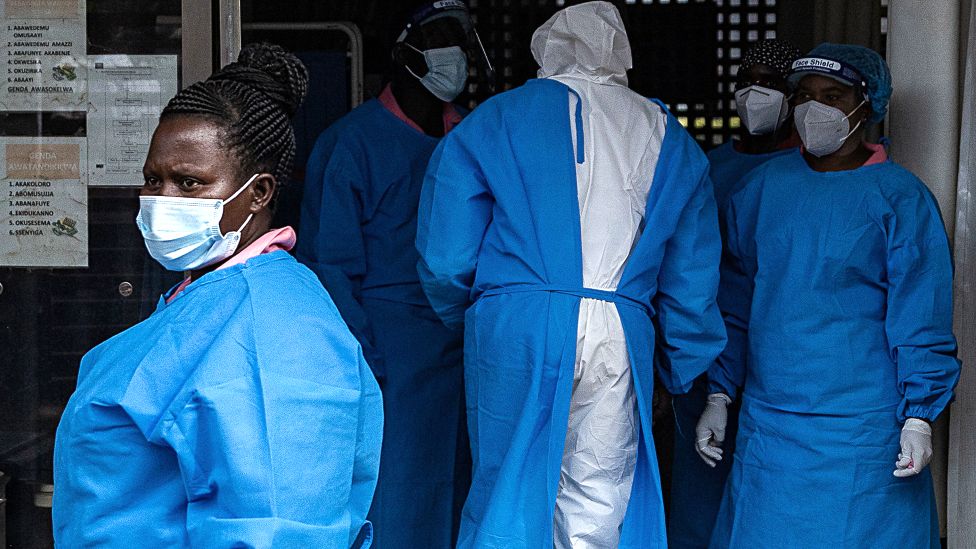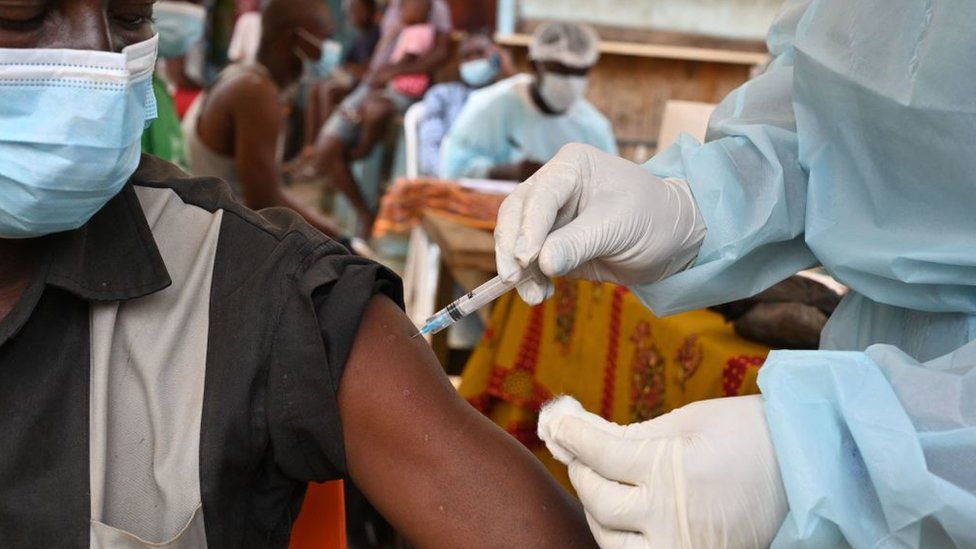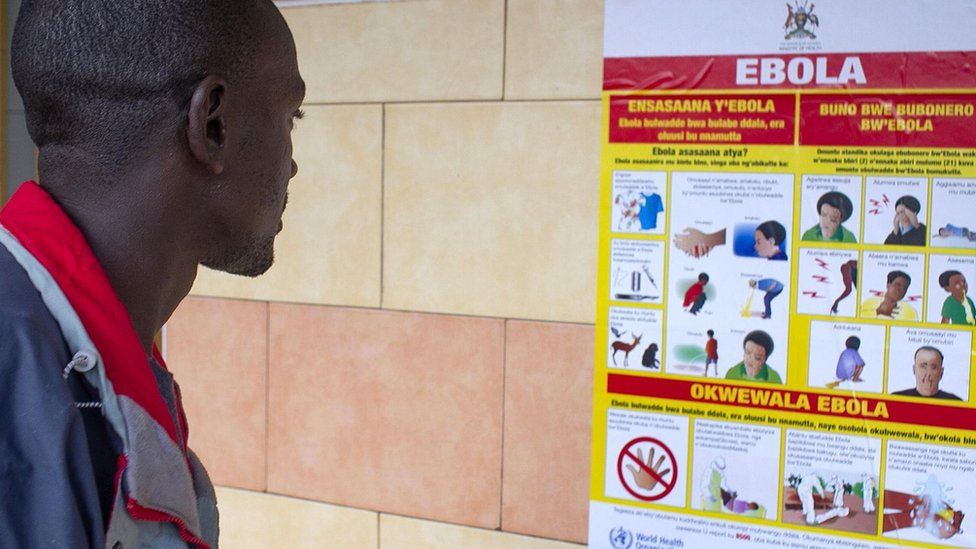Manjiri Chitre | Edited by Swati Bhasin - Monday
Uganda has reported 18 confirmed cases and 18 probable cases of Ebola so far, reported the country's ministry of health - fuelling fears of a spreading outbreak for which a vaccine has not yet been found. It also reported that a total of 23 people have died due to the disease - five confirmed and 18 probable deaths. The World Health Organization (WHO) has also dispatched a team to the East African country to help respond to the outbreak.

Uganda Ebola outbreak (AFP)© Provided by Hindustan Times
Here are the top five updates on the Ebola outbreak:
1. The Uganda health ministry has confirmed 18 cases of the Ebola disease from the Mubende, Kyegegwa, and Kassanda districts. Along with this, another 18 probable Ebola cases are also recorded. A total of 23 people have died due to the virus, the ministry said - out of which five are confirmed Ebola deaths and 18 are probable deaths.
Also read: Ghana reports highly infectious Ebola-like Marburg virus: Symptoms, treatment
2. The World Health Organization (WHO) has dispatched a team to the East African country to help respond to the health crisis. According to the WHO, while there is no cure for the disease, early detection of cases and treatment of symptoms greatly increases the chances of survival.
3. The WHO also said that a vaccine that is highly effective against the Ebola-Zaire strain does not provide cross-protection against the Ebola-Sudan strain.
4. The current outbreak first began in a small village in Mubende district around the beginning of September. On September 20, Uganda's health ministry announced the country's first fatality from the highly contagious Ebola virus since 2019.
5. The Ebola disease includes a haemorrhagic fever whose symptoms include intense body weakness, muscle pain, headache, sore throat, vomiting, diarrhea, and rashes among others.
(With inputs from agencies)
Daniel Stewart - Yesterday
The President of Uganda, Yoweri Museveni, has ruled out the application of a confinement because of the Ebola outbreak detected in the district of Mubende and has downplayed the epidemiological situation in the African country by stating that "it is very easy" to stop its spread.

Archive - Ugandan President Yoweri Museveni - XINHUA / ZUMA PRESS / CONTACTOPHOTO© Provided by News 360
"There is no need for confinement. We simply have to be careful with a few things. This time we are fighting (the disease) in a different way," said the president, who refused to "close schools, prevent people from going to churches or markets or from moving".
"We, who are used to fighting in war, when we heard about the characteristics of Ebola we decided to fight in a different way," he explained, before assuring that the authorities "have the capacity" to deal with the outbreak.
Thus, he stated that "this disease does not need great measures". "It is not spread through the air. It is an enemy that we can easily fight. The big battle is to wash our hands. Let there be no panic, because it is very easy to stop it," he argued.
Museveni has also confirmed that among the confirmed cases of Ebola there are five health workers who were exposed to the first patient identified as infected, who has already died, as reported by the Ugandan newspaper 'The Nile Post'.
The Ugandan Ministry of Health indicated on Monday in its latest report that 36 cases have been confirmed to date - 18 confirmed and 18 probable - including 23 deaths - five confirmed and 18 probable. Thirty-five people are also in hospital.
Uganda declared the Ebola outbreak on September 20 after confirming the death of a patient who tested positive, after which the World Health Organization (WHO) said the confirmation followed an investigation by the national rapid response team after six "suspicious deaths" in the district over the past month.
The agency noted that the outbreak is of the Zaire strain. To date, seven outbreaks of this strain -- four in Uganda and three in Sudan -- have been detected. Uganda reported its last case of this strain in 2012, while in 2019 it declared an outbreak for the Zaire strain, imported from the Democratic Republic of Congo (DRC).
Uganda's Ebola outbreak: Why is it so serious?
By Anne Soy
Senior Africa correspondent
 AFP
AFPAn outbreak of Ebola in Uganda is proving more difficult to deal with than more recent epidemics, but the president has rejected calls for a lockdown.
So far 31 cases have been confirmed, though it is feared that there could be many more.
What is Ebola?
It is a deadly virus with initial symptoms which can include a sudden fever, intense weakness, muscle pain and a sore throat.
Subsequent stages can include vomiting, diarrhoea and - in some cases - both internal and external bleeding, known as haemorrhaging.
The incubation period can last from two days to three weeks. Ebola can be associated with other illnesses such as malaria and typhoid.
Why is this outbreak so serious?
The fact that it was three weeks before the first case was detected on 20 September has caused concern.
Ebola spreads between humans by direct contact with bodily fluids and contaminated environments. Funerals can be a particular risk if mourners have direct contact with the body.
Most of the 31 cases identified are in Uganda's central district of Mubende, of whom six people have died.
However, the death toll may be higher as the health ministry says there were 18 deaths, linked to confirmed cases, where samples were not taken as they were buried before being tested.
The World Health Organization (WHO) estimates the case fatality rate is between 41% and 100%.
Is there a vaccine?
Another concern is that this is the Sudan strain of Ebola, for which there is no approved vaccine, unlike the more common Zaire strain.
This means there has been no vaccination of health workers, who account for six of the confirmed cases.
 GETTY IMAGES
GETTY IMAGESThe Zaire strain was responsible for the largest ever outbreak of Ebola, in West Africa from December 2013 to 2016. More than 11,000 people died.
With more than 28,000 cases in Guinea, Liberia and Sierra Leone, scientists carried out intensive research into Ebola vaccines.
Two years after that epidemic ended, the then unlicensed Ervebo vaccine, developed by Merck, was used during an outbreak of the Zaire strain in the west of the Democratic Republic of Congo.
It was granted clearance by the WHO, which said it had limited infections and saved lives.
A second vaccine by Johnson & Johnson has since been approved for use by the European Medicines Agency.
But neither of these vaccines has been tested against the Sudan strain.
Nonetheless Uganda's President Yoweri Museveni said his government was exploring whether it was worth trying them.
How is Uganda dealing with the outbreak?
The focus is on contact tracing - finding those who have been in close proximity with patients, especially those who attended the community funerals.
A 51-bed treatment facility is operational in Mubende district, the epicentre of the outbreak, and a second facility is due to be set up soon.
President Museveni said two mobile laboratories would be sent to Mubende by Friday, so that people would not have to travel for tests and so risk spreading the virus.
Medics have expressed concern about the lack of adequate personal protective equipment (PPE) such as gloves and masks. They have also called for the affected region to be put under quarantine.
However, President Museveni ruled out restrictions, saying: "Ebola is not spread like corona[virus]" as it is not an airborne disease.
He said markets, schools and places of worship would remain open, but urged people to observe personal hygiene and avoid close contact.
How does Ebola spread?
Ebola jumps to humans from infected animals, such as chimpanzees, fruit bats and forest antelope.
Bushmeat - wild forest animals hunted for human consumption - is thought to be the natural reservoir of the virus.
It then spreads between humans by direct contact with contaminated bodily fluids - blood, saliva, vomit, semen, vaginal discharge, urine, faeces and sweat.
Men who have recovered from Ebola have also been found to harbour the virus in their semen for a period after recovery.
What precautions can be taken?
To prevent infection, health professionals advise avoiding contact with cases, including stopping shaking hands, washing hands with soap and water and cleaning surfaces with chlorinated water.
It is also important to isolate cases and their contacts. Countries usually set up holding centres for suspected cases and treatment centres for laboratory-confirmed cases.
 EPA
EPAIn eastern DR Congo, which borders Uganda, survivors of Ebola played a key role in providing care for infected patients as it has been established that they cannot be re-infected.
However, medical teams must wear full PPE when attending to cases to prevent infection.
Bodies, in a body bag, must be buried by those wearing proper PPE. More recent innovations have included having body bags with clear covers around the face to enable families to view the body safely before burial.
No comments:
Post a Comment